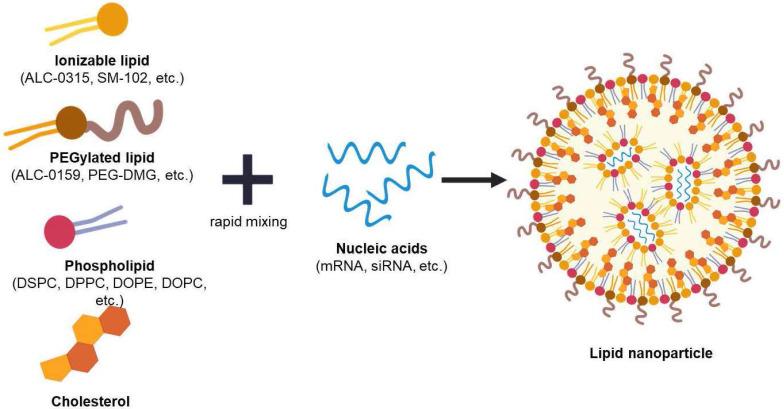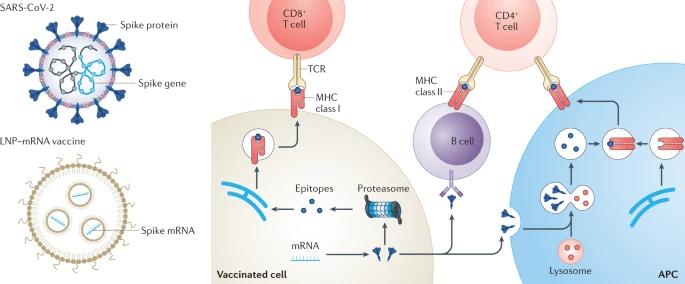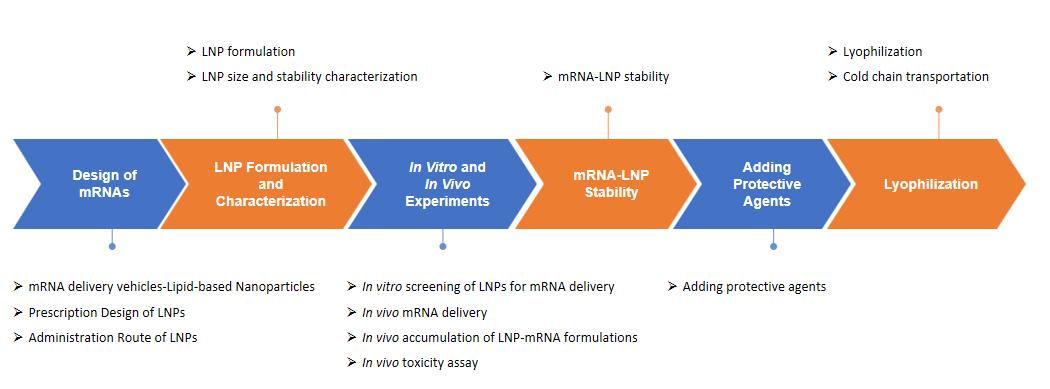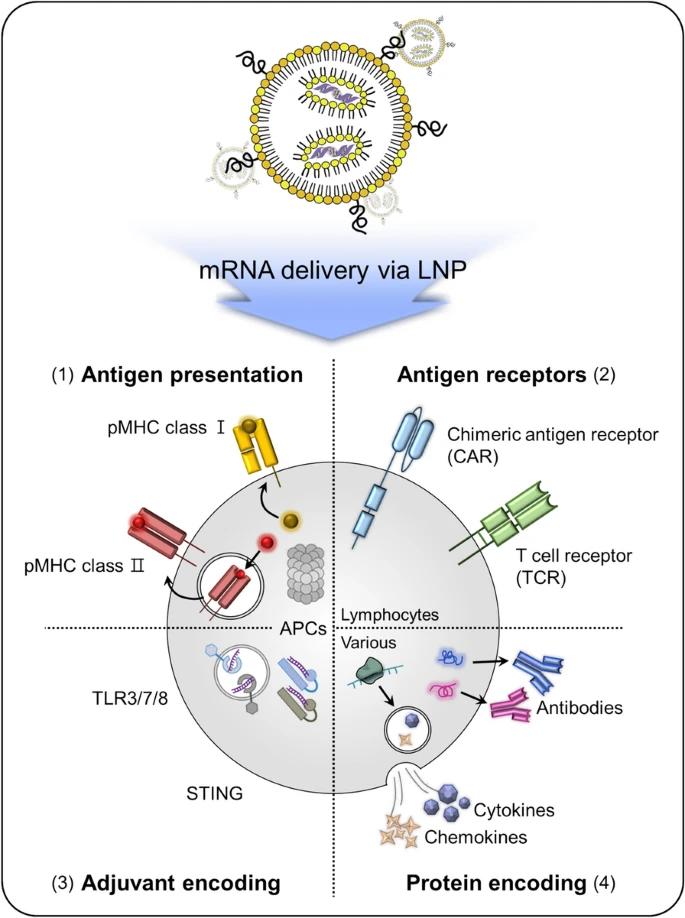Lipid Nanoparticle-based mRNA Delivery System for Biologics
Inquiry
With the development of nanotechnology, lipid nanoparticles have been further developed by functionalizing with targeting ligands or polymers. Lipid nanoparticles have played an important role in mRNA delivery. CD Formulation has been committed to researching and designing lipid nanoparticle-based mRNA delivery systems for years, catering to clients' diverse customization needs for these systems in biologics.
Advantages of Lipid Nanoparticle-based mRNA Delivery
Lipid nanoparticles (LNPs) are composed of ionizable lipids, PEG, cholesterol, and helper lipids, which encapsulate mRNA within an aqueous core to protect it from degradation. The key advantages of LNP-based mRNA delivery include:
- Enhanced Delivery Efficiency: LNPs significantly improve mRNA delivery efficacy.
- Organ- and Cell-specific Delivery: LNPs can be tailored for precise targeting, such as delivering mRNA to the brain via neurotransmitter-derived LNPs.
- Synergistic Therapeutic Effects: LNPs can enhance the therapeutic effects of mRNA-encoded proteins.
- Stability at Room Temperature: LNPs extend the shelf-life of mRNA, reducing cold chain dependency for vaccines.
- Reduced Dosing: Stable LNPs allow lower mRNA doses to achieve therapeutic efficacy.
- Adjuvant Properties: LNPs act as adjuvants, boosting the immune response in vaccines.
 Fig.1 Illustration of lipid nanoparticle and its compositions. (Han Na Jung, et al. 2022)
Fig.1 Illustration of lipid nanoparticle and its compositions. (Han Na Jung, et al. 2022)
Applications of Lipid Nanoparticle-based mRNA Delivery Systems
LNP-mRNA formulations have broad applications across infectious diseases, cancer immunotherapy, and genetic disease treatments:
- Infectious Diseases: LNP-mRNA formulations offer a robust alternative to traditional vaccines, as demonstrated by their use in COVID-19 vaccines.
- Cancer: LNP-based mRNA delivery has shown promise in cancer immunotherapy, including mRNA vaccines, chimeric antigen receptor (CAR)-engineered immune cells, and cytokine therapies.
- Genetic Diseases: mRNA-based protein replacement therapies are advancing treatments for metabolic disorders like cystic fibrosis, ornithine transcarbamylase deficiency, and methylmalonic acidemia.
 Fig.2 LNP-mRNA formulations as COVID-19 vaccines. (Xucheng Hou, et al. 2021)
Fig.2 LNP-mRNA formulations as COVID-19 vaccines. (Xucheng Hou, et al. 2021)
Our Methods for LNP-based mRNA Delivery System Production
With the help of our innovative lipid nanoparticle technology platform, CD Formulation offers multiple production methods for LNP-mRNA formulations to optimize encapsulation and stability.
Thin-film Hydration
Thin film hydration is the most commonly used technique for lipid nanoparticle production, and this method is a passive encapsulation method. Cationic liposomes are the most used delivery vehicles for mRNA preparations. Lipids are dissolved in an organic solvent and subsequently evaporated by a rotary evaporator to form a thin lipid layer. We use an aqueous buffer solution loaded with mRNA to hydrate the thin layer, and the hydrophobic and hydrophilic parts of the lipid nanoparticles will self-assemble to form multilamellar vesicles.
Ethanol Injection
Ethanol injection is a commonly used technique to form unilamellar liposomes. In this method, we dissolve lipids in ethanol and quickly inject them under stirring into an aqueous buffer containing the drug or compound to be encapsulated, in which the volume is relatively higher than the lipid solution, where vesicles are rapidly formed.
T-junction Mixing
T-junction mixing can produce reproducible and controllable mRNA-loaded LNPs, which encapsulate mRNA with higher encapsulation efficiency. In this method, we generate turbulence by injecting two different solvents at each inlet for rapid mixing at collision.
Microfluidic Mixing
mRNA-LNP was formulated using novel synthetic ionizable lipids. We dissolved Lipids, DSPC, cholesterol, and PEG2k-DMG in ethanol mixed with mRNA buffer solution and dissolved at different total flow rates (TFR) through a microfluidic system. Then we regulated the size of mRNA-LNPs by TFR control, and as TFR increased, the particle size decreased, allowing for control of uniform mRNA-LNP particle size and distribution.
Our Lipid Nanoparticle-based mRNA Delivery System Development Process
Lipid nanoparticle-based mRNA delivery can be achieved via endocytosis followed by electrostatic binding and fusion with the cell membrane via the inverted non-bilayer lipid phase. Relying on our state-of-the-art lipid nanoparticle technology platform, and after many years of research on lipid nanoparticle-based mRNA delivery technology, we have summarized a complete set of mRNA-LNP formulation development processes to guide customers in the personalized customization of different mRNA-LNP formulations.
 Fig.3 Our Lipid Nanoparticle-based mRNA Delivery System Development Process. (CD Formulation)
Fig.3 Our Lipid Nanoparticle-based mRNA Delivery System Development Process. (CD Formulation)
Why Choose CD Formulation?
- Depending on our advanced lipid nanoparticle technologies, we have established and optimized multiple nanotechnology platforms for targeted mRNA delivery.
- Our technicians focus on exploring strategies for constructing lipid nanoparticle-based mRNA delivery systems and can also provide customers with customizing lipid nanoparticles for mRNA delivery systems by choosing suitable fabrication methods.
- We have extensive experience in studying and investigating the construction methods and techniques of lipid nanoparticle-based mRNA delivery systems. Additionally, we are capable of providing services for the development of mRNA-LNP formulations.
Custom Lipid Nanoparticle Development Services for mRNA Delivery
Lipid nanoparticles are the most advanced mRNA delivery system in the clinic, widely used for systemic hepatocyte targeting and intramuscular vaccine administration and have now achieved breakthroughs in the release of mRNA therapeutics in various diseases. At our lipid nanoparticle technology and mRNA delivery technology platform, CD Formulation has focused on designing and developing lipid nanoparticles for mRNA delivery systems, catering to customers' different personalized needs and promoting the rapid development of mRNA therapeutics.
Lipid Nanoparticle Development for Nanomedicine
We specialize in the research of mRNA delivery technology based on lipid nanoparticles. After continuous experimental accumulation and gradual improvement of the mRNA-LNP formulation development process, we can customize and develop personalized mRNA-LNP formulations for different customers, thereby rapidly promoting the clinical transformation and clinical application of mRNA-LNP.
Published Data
Technology: Lipid nanoparticle-based mRNA delivery systems
Journal: Nano Convergence
IF: 13.4
Published: 2023
Results:
The authors summarize the latest advances in lipid nanoparticle-based mRNA delivery systems and strategies to optimize the design and delivery of mRNA-encoded therapies in cancer treatment. At the same time, the authors study the challenges encountered in this field, aiming to improve the safety and efficacy of lipid nanoparticle-based mRNA cancer immunotherapy. Lipid nanoparticles have become an important candidate for mRNA delivery in cancer immunotherapy, which can both provide protection for mRNA and improve the efficiency of intracellular delivery. Therefore, lipid nanoparticle-based mRNA delivery systems have great prospects in fighting malignant tumors.
 Fig.4 Schematic of strategies for LNP-based mRNA delivery. (Jieun Han, et al. 2023)
Fig.4 Schematic of strategies for LNP-based mRNA delivery. (Jieun Han, et al. 2023)
As your loyal partner in the development and production of nanoformulations, relying on our world-leading lipid nanoparticle-based mRNA technology system, CD Formulation can provide customers with mRNA-LNP formulation development to help customers come true clinical transformation of mRNA therapy. If you are interested in our lipid nanoparticle-based mRNA technology delivery system for biologics and mRNA-LNP formulation development services, please kindly do not hesitate to reach out to us.
References
- Han Na Jung, Seok-Yong Lee, Somin Lee, et al. Lipid nanoparticles for delivery of RNA therapeutics: Current status and the role of in vivo imaging. Theranostics. 2022,12(17): 7509-7531.
- Xucheng Hou, Tal Zaks, Robert Langer, et al. Lipid nanoparticles for mRNA delivery. Nature Reviews Materials. 2021,6:1078-1094.
- Jieun Han, Jaesung Lim, Chi-Pin James Wang, et al. Lipid nanoparticle-based mRNA delivery systems for cancer immunotherapy. Nano Convergence. 2023,10:36.
How It Works
STEP 2
We'll email you to provide your quote and confirm order details if applicable.
STEP 3
Execute the project with real-time communication, and deliver the final report promptly.
Related Services


 Fig.1 Illustration of lipid nanoparticle and its compositions. (Han Na Jung, et al. 2022)
Fig.1 Illustration of lipid nanoparticle and its compositions. (Han Na Jung, et al. 2022) Fig.2 LNP-mRNA formulations as COVID-19 vaccines. (Xucheng Hou, et al. 2021)
Fig.2 LNP-mRNA formulations as COVID-19 vaccines. (Xucheng Hou, et al. 2021) Fig.3 Our Lipid Nanoparticle-based mRNA Delivery System Development Process. (CD Formulation)
Fig.3 Our Lipid Nanoparticle-based mRNA Delivery System Development Process. (CD Formulation) Fig.4 Schematic of strategies for LNP-based mRNA delivery. (Jieun Han, et al. 2023)
Fig.4 Schematic of strategies for LNP-based mRNA delivery. (Jieun Han, et al. 2023)
